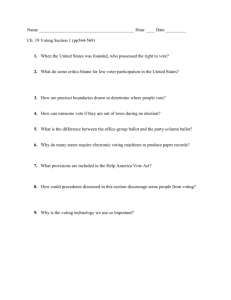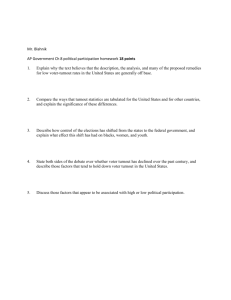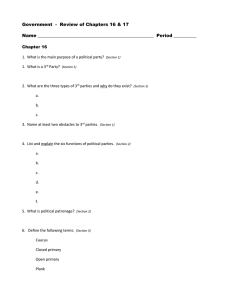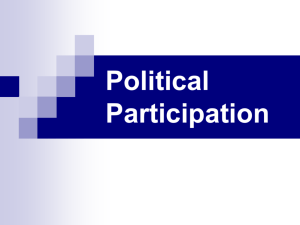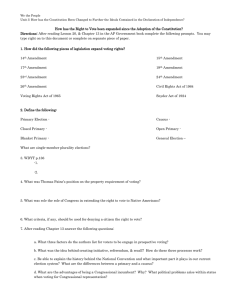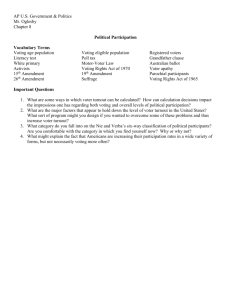political participation and polling
advertisement
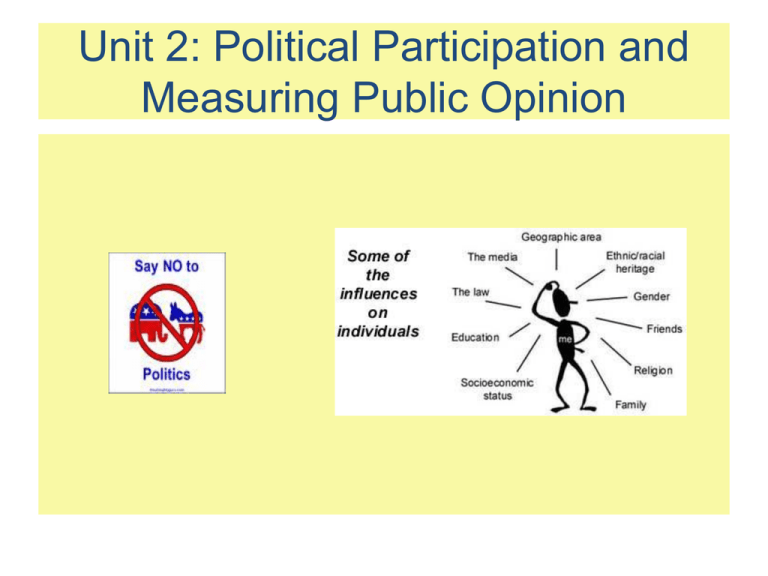
Unit 2: Political Participation and Measuring Public Opinion Political Culture - Key Terms Political Culture – Widely or commonly held beliefs/attitudes within a society. ●Political Socialization – The process by which citizens acquire their political beliefs. (what are the 4 agents?) -family -schools -religious institutions - media (be careful…selective perception) ●Political Ideology – A set of principles that provides guidance on the proper behavior of government. ● What is unique about American political culture? ● Efficacy – citizen’s belief in their ability to impact government. ● ● ● Legitimacycitizen’s belief that the government has the right to rule. Individualism/limited government/American dream – the individual is responsible for finding prosperity. Patriotism – Rally around the flag. Trends in US Political Culture ● Patriotism and “rally around the flag”during WW I, WW 2 through 1950s, 1976 bicententual and most recent surge after 9-11 Polls • Relied upon by news services • Dev. In the early-mid 1900s • Good polling includes asking objective questions to to a small group, • a sampling to find out what a larger group thinks. • Straw polls-non-scientific tallies to make predictors of upcoming elections • http://ballotpedia.org/Presidential_election,_201 6/Straw_polls Gallup Poll and others • George Gallup-father of modern public opinion polling-Gallup Poll Other respected polls • Zogby Poll • Rasmussen Poll • Quinnipiac Polls News organization polls-NBC, Washington Post, CNN, Fox News-methodology can be questionable Characteristics of a valid scientific pollgood methodology 1. Avoids open-ended questions-allow for more conclusive results 2. Phrasing questions not to skew results---a bad question: “Should the US give foreign aid to other children to other nations to help them resist temptation.” 3. Obtaining a random sample 4. Accounting for margin of error Kinds of Polls 1. Tracking Polls-track path of public opinion on certain issues 2. Exit Polls- conducted outside voting centers as people leave-predict outcome of election 3. Focus Groups-groups of citizens who meet w/ candidate…Mitt Romney on jeans (2012) 4. Approval Ratings-for president or congress Trust in Government Which presidencies and historical events correlated with the increase and decrease in trust for the US government? Trust in Government a story on NPR Do Americans trust the government? How has trust in government changed over the years? What factors impact trust in government? What occurred in trust immediately after 9/11 & why? Ideology – size of government ● Conservatism - small government on economic matters - large government on moral matters ● Liberalism - small government on moral matters - large government on economic matters ● Libertarianism ● ● Small government on moral matters Small government on economic matters The issues Democrats Republicans ● Liberal ●Pro spending on social programs ●Pro choice ●Gay rights ●Secular ●Relax immigration rules ●Gun control ●Affirmative Action ●Campaign regulations ●Anti death penalty ●Federal government power ●Proactive on environment ● Conservative ●Pro spending on military ●Pro life ●Pro traditional marriage ●Allow religion in public life ●Border control ●Second Amendment rights ●Individualism ●Economic freedom on campaigns ●Pro Death Penalty ●State government power ●Environmental regs hurt businesses Embrace change ● Embrace Tradition Voting Coalitions/Blocs of the Two Parties: Democrats Young (18-21) ●Women ●African American ●Jewish ●North Eastern & Western Regions ●Urban ●Union ● Republicans Upper Income ●Protestant/church going ●Military families ●South ●Midwest ●Rural ● Poll/Survey: which candidate would you most identify with? http://www.isidewith.com/ Strengths of this Poll? Weaknesses of this poll? African American voters in the 2004 Election Race in 2010 Mid Terms: Religion in 2010 elections: http://pewresearch.org/pubs/179 1/2010-midterm-elections-exitpoll-religion-vote Religion in the US in Maps Political Participation Forms: - voting - protest -grass roots -boycotts - joining an interest group or party - working on a campaign -donating money ● Political Participation Forms: -Social Movements What is a social movement? What are examples of social movements? -How have social movements changed over time? Gladwell article on social media’s influence Political Participation Contemporary Social Movements Occupy Wall Street Gay marriage Americans for Tax Reform Voter Turnout What is an average turnout in a Presidential election? ● In a “mid term” election? ● Off year? ● Primary? Closed primary? ● What types of voters vote in low turnout elections? 62% of voting age population turned out to vote in 2012 (highest since 1960-JFK v Nixon) Mid-term voter turnout down ● Reasons for Low Voter Turnout 1. Voter Registration 2. Absentee Ballots 3. Single Day, Tuesday Voting 4. Young (18-21) 5. Low income 6. Expansion of suffrage 7. Voter Apathy-satisfied or dissatisfied w/ govt What is the impact of low turnout? Expansion of Suffrage and the Electorate 13th amendment • 1865 • The abolishment of slavery • Slavery is made illegal in the United States 14th amendment (Rights of the Citizens • 1868 • Every citizen of the United States is a citizen of the state in which he or she lives. No state may pass a law limiting the rights of citizens take away someone’s life to life, liberty and property unfairly • Every citizens must be treated equally under the law • Officially made former slaves citizens 15th Amendment (Voting Rights) • No person may be denied the right to vote b/c of race • Officially gave African American men the right to vote 1. Poll Taxes- a special tax blacks had to pay to vote-many couldn’t afford it 2. Literacy Tests- some in other languages-if you couldn’t pass it, you couldn’t vote 3. Grandfather clauses- if your grandfather wasn’t eligible to vote, you couldn’t vote 4. White primary 19th amendment • 1920 • Gave all women the right to vote 23rd amendment • (1961) • Gave people of Washington DC the right to vote for President and Vice President 26th amendment (Voting Age) • 1971 • Gave 18 year olds the right to vote in all US elections Political Behavior (Unit II)

